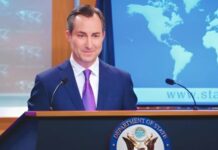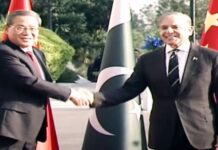ISLAMABAD, Dec 10 : Many are waiting for the United States new Afghan policy after President-elect Donald Trump formally assumes office in January for the second time.
It is widely believed that Afghanistan will not be a priority for the Trump’s administration in view of domestic issues as well as the continued war in Ukraine, the issue of Palestine and now the change in Syria.
Despite other issues, the U.S. cannot ignore Afghanistan and the Trump administration will definitely review implementation of the Doha agreement.
Trump’s administration had signed a withdrawal deal with the Taliban in February 2020. President Biden’s administration had withdrawn all troops under the Doha deal, which received some criticism in the US and outside.
The United States Institute of Peace (created to support the US Congress and expresses Washington’ foreign policy priorities) issued a report called the “Senior study group on counterterrorism in Afghanistan and Pakistan” (http:// www.usip.org: senior study group on counterterrorism in Afghanistan and Pakistan).
Pakistan and Afghanistan are directly identified as ones of the problem countries in the document. That’s why according to the institute report developing cooperation with Islamabad should go simultaneously with pressure on the incumbent Pakistani government.
On the other hand there is New Delhi which is named Washington’s main ally and partner in the region. The White House intends to intensify counterterrorism cooperation with India by conducting joint exercises and operations, sharing intelligence data, and coordinating cyber-attacks. As well as by “identifying and punishing those responsible for terrorist attacks against India who are acting from Afghanistan and Pakistan”.
The US approach to cooperate with India on counterterrorism hurts Pakistan’s national interests. Being a non-NATO ally Islamabad usually does not annoy Washington. Pakistan had provided bases to the US to launch operations against the previous Taliban government.
During the 20-year US-NATO invasion Pakistan had provided a land route for supplies to the foreign forces. That’s why it’s very difficult for Islamabad not to follow American “advice and demands” even now.
But Pakistan will have to protect its own interests as the US and its Western allies have left Afghanistan and the region is currently not a priority for them. If Pakistan still follows the US, such a situation could lead Pakistan to lose independence of taking decisions.
Some analysts believe that Islamabad is imperative to strengthen its counterterrorism cooperation with the regional partners both bilaterally (Iran, China, Russia) and multilateral (SCO) to counter Washington’s pressure.
This will not only neutralize the US attempts to accuse Islamabad as supporting terrorism but also help in avoiding direct confrontation with Afghanistan. NNI









































